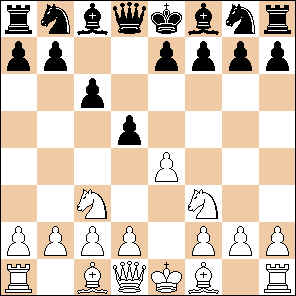

I have never faced any problems, even against a computer -> positions are simplified and tend to fizzle out to a draw. That being said, each time I played opening well, I drew with ease. You must know opening moves and typical middlegame positions that arise very well in order to have equal chances. I was trying to play this line, relying on general principles, against computer/stronger opponents and things went very bad.

Your best bet to dodge this is to play Rubinstein variation, which is positional in nature and has a reputation of being solid: ġ.e4 e6 2.d4 d5 3.Nc3 ( 3.Nd2 dxe4 4.Nxe4 ) 3.dxe4 4.Nxe4 If he chooses, he can make things so sharp that both of your heads will explode. Your biggest problem is the fact that it is White who steers the game.
#Panov botvinnik attack pdf series#
There is also the Grandmaster Repertoire Series on it, with two volumes by Emmanuel BergĪnd lastly, The Flexible French by Viktor Moskalenko (French Defense expert) should not be ignored įrench can get very sharp. Probably the definitive French Defense repertoire book is Play the French by John Watson (4th Edition) (3rd also fine), which I highly recommendĪlso good is Chess Explained: The French by Viacheslav Eingorn and Valentin Bogdanov, this covers the Rubinstein variations of the French and more Unfortunately, you cannot avoid complications, despite how much you want to, there are going to be complications, just because you play this line, doesn't mean the game can't somehow explode into a tactical mess.Īlso how can you be a French player if you don't want to play the critical f7-f6 pawn break? That "break" defines so much of the French! There are several excellent books covering the French Defense. So any more suggestions would be appreciated, thanks. exd5 with 4.Qxd5 (I heard that 3.Nf6 was extremely sharp and tactical) (and 3.Be7 looks too subtle for a non-GM) Nd2 I should probably choose 3.c5 and answer 4. Nc3 I should probably choose 3.Nf6 (I heard that 3.Bb4 was extremely sharp and tactical)Īnd against 3. I don't know much about the French so I don't know exactly which of these moves are sharp/tactical and which of them are solid/positional/quiet.īut I would guess that against 3. Nd2 it isn't even efficient at making draws. dxe4 scores extremely poorly both against 3. I’ve looked in my ChessBase Mega Database and on Chess Tempo games database and here is what I found out:Ī: The average Elo that Black is expected to lose, ie minus - Statistics from Chess Tempoī: The average Elo that Black is expected to lose, ie minus - Statistics from ChessBase (selecting only games where both players were rated between 17)Ĭ: The percentage of games that ended in a draw - Statistics from Chess Tempoĭ: The percentage of games that ended in a draw - Statistics from ChessBase (selecting only games where both players were rated between 17)Ĭonclusion: 3. I don’t really like 3.Nc3 dxe4 and 3.Nd2 dxe4. f7-f6 (except when it's totally necessary). If possible, I would like that the repertoire tries to avoid playing the Pawn break. I want as few sharp and tactical lines as possible. The Black repertoire proposed in the book must (on average) tend to lead to positions which are as much solid, positional, slow, closed, quiet and strategic as possible. with the board flipped, that would be great.)

e4) (And if the diagram boards in the book show Black at the bottom, ie. (I don't care about playing the French Defence as White since I don't play 1. It must cover the French Defence from the point of view of Black only. It must offer a complete Black repertoire. I am looking for one or more books about the French Defence which fits these 3 conditions: I am a 1750 Elo player with a very positional, quiet and strategic style of play.


 0 kommentar(er)
0 kommentar(er)
